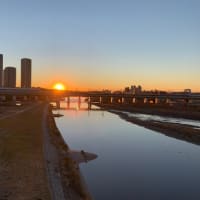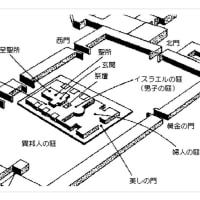30篇 嘆きは踊りに変わる
1.背景
「家をささげる歌」とあります。実際に二つの背景が考えられています。一つは、ダビデがサタンに惑わされて人口調査の罪を犯した時です(1歴代誌21章)。その時、神は怒り、イスラエルに疫病の災いを下されました。そこでダビデが、罪を犯したのは自分である、と神に訴えると、神はその罪のつぐないのために、エブス人オルナンの土地に祭壇を築くように命じるのです。ダビデは祭壇を築き、全焼のささげ物と交わりのいけにえを献げ、神はそれを受け入れられました。その時にダビデは言うのです。「これこそ、神である主の宮だ。これこそイスラエルの全焼のささげ物の祭壇だ」(1歴代誌22:1)。ここでダビデが「神である主の宮だ」と語った原語は、バイト、通常「家」と訳されることばです。ですから詩篇30篇の表題の「家をささげる歌」は、直訳ですが、人口調査が背景だとするならば、神殿奉献の歌、口語訳のように「宮をささげる時にうたったダビデの歌」、あるいは新共同訳のように「賛歌。神殿奉献の歌」となるのでしょう。
そして二つ目に、これは、サウルの死後、ダビデが指導的立場に立ったものの、ペリシテ人の勢いが強くその侵略がエルサレムに達し、宮殿に入ることができなかった時に歌われた、という説があります(2サムエル記23:13-17)。となれば新改訳のように「家」という訳でも違和感はないとなります。
ただこの詩は、2節「私が叫び求めるとあなたは私を癒してくださいました」と何か致命的な死の危機から脱出した経験を想定させます。そうすると、三つ目の背景として、ダビデがただ高慢に陥り身体的に弱められ、死の床にあった時と考えることもできます。となれば、種々の可能性を秘めて、新改訳のように直訳で訳出した方がよい、ということにもなるでしょう。
2.嘆きを踊りに変える
詩の構造も内容も単純です。まずダビデは、率直に神の恵みに感謝しています。「まことに御怒りはつかの間。いのちは恩寵のうちにある」神の怒りは、いつまでもだらだらと続きません。5節「夕暮れには涙が宿っても、朝明けには喜びの叫びがある」とありますが、「宿って」と言う単語は、一夜泊まりの客を意味します。つまり「夕べに到着した客は一晩限りの宿泊である」ということです。夜の後には必ず朝がくるように、神は闇のままに物事を終わらせることはありません。ダビデはそのような神を信頼し、死の滅びの淵から助け出してくださるように、祈り求めるのです。
9節ダビデは言います。「私が墓に下っても、私の血に何の益があるでしょうか」確かに塵芥のような人間が死んだら、それで終わりです。しかし、もし、神がそのような人を救ったとなれば、神は恵み深いお方として褒め称えられるのです。情けをかけるに足りない存在であるにもかかわらず、神は関わってくださるのです。となれば神に深い感謝をもって、神のあわれみ深さと恵み深さを讃えることにもなるでしょう。
人口調査の時なのか、あるいは、ペリシテの侵略の時なのか、いや、聖書には綴られない、ダビデが窮地に立たされた時のことなのか、この詩が読まれた背景はよくわかりません。注目すべきは、神が、たとえ高慢になって失敗することがあっても、神が心からの悔い改めと祈りに応えて、ダビデのいじましい面目を保たせてくださった、ということでしょう。人間は、本当に勝手なものであるし、その自己中心性は病です。そして自業自得の罪を犯すものです。しかしたとえそうであっても、神は、神を恐れ、悔いるたましいを捨て置かれることはない、というダビデの経験に教えられます。しばしば人は、自分の厚かましさ、愚かさ、変わり難い性質、不誠実さに深く心を責められ、こんな自分に神のあわれみがあるだろうか、と思うものでしょう。けれども、神のあわれみというのは、それらを与えることがふさわしくない者に与えられるものを言うのです。ふさわしい者に与えられるものは報酬です。ですから、あわれみ深い神であるからこそ、恐れつつ、ただひたすらそのあわれみ深さに飛び込み、諦めずに願い祈ることでしょう。神はあなたを立たせてくださるのです。では今日もよき一日となるように祈ります。
<クイズコーナー>
最初に、昨日のクイズです。アンティ・レバノン山脈にあるイスラエル最高峰の山は、次のどれでしょうか?①ヘルモン山、②レバノン山、③ネボ山。答えは①ヘルモン山でした。では、今日の聖書クイズです。全焼のささげ物のささげ方の特徴は、どれでしょうか?①すべてを焼き尽くす、②脂肪のみ焼き、残りは皆で食べる、③一部を焼き、残りは祭司のものとする。答はまた明日。では今日もよき一日となるように祈ります。
Psalms 30: Lament Turns into Dance
1. background
The text reads, "A song to offer the house." Two or three backgrounds are actually considered. One is when David was deceived by Satan and committed the sin of population census (1 Chronicles 21). At that time, God was angry and sent a plague of pestilence upon Israel. When David complained to God that he was the one who had sinned, God commanded him to build an altar in the land of Ornan the Jebusite to make atonement for his sin. David builds the altar and offers a burnt offering and a communion sacrifice, which God accepts. Then David says, "This is the LORD my God. This is the temple of the Lord our God. This is the altar of the burnt offering of Israel" (1 Chronicles 22:1). The original word David uses here, "the temple of the Lord God," is byte, a word usually translated "house. So the title of Psalm 30, "Song of the dedication of the house," is a literal translation, but if the population census is the background, it could be a song of temple dedication, "David's song sung at the dedication of the temple," as in the colloquial translation(Kougo-yaku), or, as in the New Common Translation(Kyoudou-yaku), "A hymn. It would be "a song of consecration of the temple.
And secondly, there is a theory that this was sung when David took the leadership position after Saul's death, but the Philistines were so strong that their invasion reached Jerusalem and he could not enter the palace (2 Samuel 23:13-17). If this is the case, it would not be out of place to translate the word "house" as in the New Revised Version(Shinkai-yaku).
However, the verse 2, "When I cried out to you, you healed me," suggests the experience of escaping from a fatal death threat. Then, we can think a third possible background, it could refer to the time when David was on his deathbed, physically weakened by pride. This would suggest that the literal translation, as in the New Revised Version, is the better translation, given the various possibilities.
2. turning lamentation into dance
The structure and content of the poem are simple. First, David frankly thanks God for His grace. He says, "Truly, Thy wrath is fleeting. Life is in grace." God's wrath does not continue slack-jawed indefinitely; verse 5, "Though tears dwell at dusk, at dawn there is a shout of joy." The word "dwell" refers to a guest who stays the night. In other words, "a guest who arrives at dusk stays only one night. God does not let things end in darkness, just as there is always morning after night. David trusts in such a God and prays to Him to rescue him from the perdition of death.
Verse 9 David says. Surely if a dusty human being dies, that is the end of him. But if God saves such a person, He is praised as the gracious One. God is involved, even though we are not worthy of His mercy. Then, with deep gratitude to God, we would also praise God for His mercifulness and graciousness.
We are not sure of the context in which this psalm was read, whether it was during the time of the population census, or the Philistine invasion, or even David's predicament, which is not spelled out in the Bible. What is perhaps noteworthy is that God allowed David to save his tormented face in response to his sincere repentance and prayers, even though he was proud and made mistakes at times. Humans are truly selfish and their self-centeredness is a disease. And we are guilty of self-inflicted sins. But even so, we are taught by David's experience that God will not abandon a soul that fears Him and repents. Often people are so deeply condemned by their own arrogance, foolishness, unchangeable nature, and unfaithfulness that they wonder if God will have mercy on them. But God's mercy is what is given to those who do not deserve it. What is given to those who deserve it is a reward. Therefore, because God is merciful, you must dive into His mercy with fear, and pray without giving up. God will make you stand. I pray that today will be another good day.
<Quiz Corner
First, yesterday's quiz. Which of the following is the highest mountain in Israel located in the Anti-Lebanon Mountains? (1) Mount Hermon, (2) Mount Lebanon, and (3) Mount Nebo. The answer was (1) Mount Hermon. Now, here is today's Bible quiz. Which of the following is characteristic of the offering of the whole burnt offering? (1) All is burned up, (2) Only the fat is burned and the rest is eaten by all, (3) Part of the fat is burned and the rest belongs to the priests. The answer will be given tomorrow. Now, I pray that today will be another good day.


















